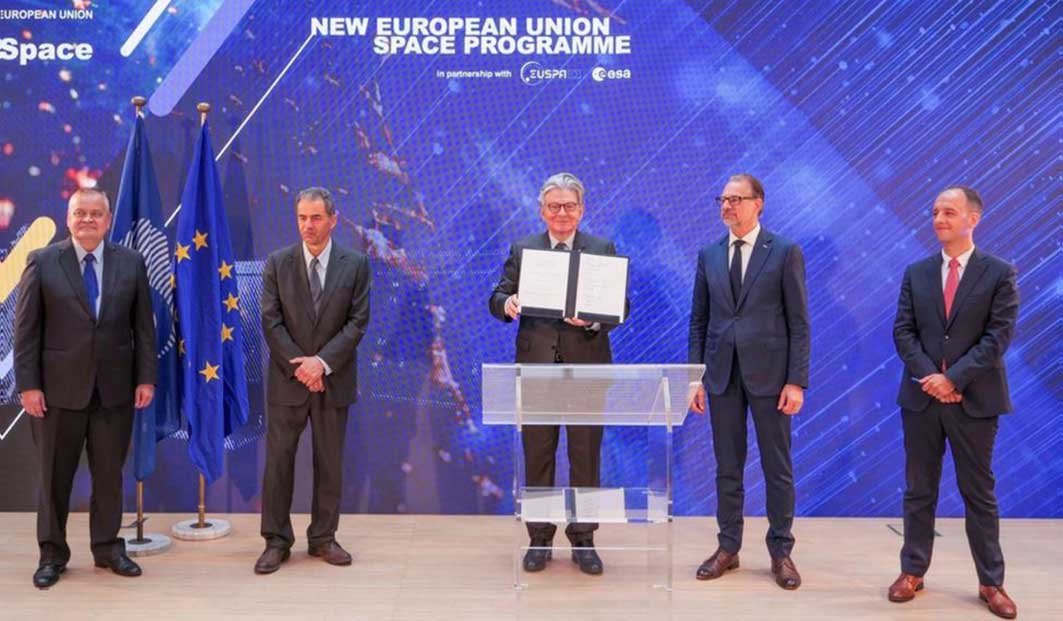European Union’s: The European Union agency for the space program formed on the triumph of the European GNSS agency to make sure that citizens can create opportunity and supports the economy of their own country
History
On the 28th of April 2021, the parliament of Europe granted the update of the EU space program. This is from the way of the creation of a European Union agency for the space program. And before that on-
2002 May- Their story begins with the Galileo Joint undertaking by the EU community and European space agency to manage its development.
2004 July- European GNSS supervisory established as a community agency by the council regulations.
2018 June- The European commission transform the European GNSS agency into the European Union space program agency.
2020 December- The European Commission granted the agreement between the EU parliament and the council on the EU space program.
2021 April- Finally the EU parliament updated the EU space program regulation by creating the European Union Agency for the Space Program.
Currently, their HQ is located in Paris, France, and the Executive director’s name is Rodrigo da Costa.
What European Union’s Space Agency DO
The European Union agency is latitude for the space program regulates by the EU space program regulation. They are looking for a secure and safe of The European union. If we are talking about Space you have to check Space tourism.
European Union’s Space Agency Goals
Provide a long-term safe on positioning, navigation, timing service, and satellite communications service. Promote, communicate and develop a sustainable marketplace for the data, information, and services offered by its relevant organizations.
Provide space tools and services to increase the safety of the union and its member states. Watch and implements the security of the program and helps in the reference for the use of the security service. Contribute to a competitive industry for its parent organizations, along with autonomy, technological autonomy for the union and its member states. -European Union’s
Enhance the socio-economic benefits of the EU Space Program through the development of a competitive and innovative industry for its parent organizations by funding mechanisms and innovative acquisition. Promote the development of a wider European space ecosystem across innovation, entrepreneurship, and start-ups in Member States and Union regions.
European Union’s Space Agency Vision
Their vision is to take on the space program. It owns an approach for sustainable growth and increases the security and safety of the European Union. Moreover, this program is helping to foster the European Union’s objectives and to do its key policy goals and priorities.
Values
They care who they work with. They believe in European values. They have respect for the people and environment. And respect diversity with a professional point of view to improve their knowledge, skills, and ethical standards. They figure out for innovative and innovation at their workplace to boost their performance. As well together they are all reliable and accountable based on their thoroughness.
Who belongs to ESA?
Many countries like Austria, Belgium, Czech Republic, Denmark, Estonia, Finland, France, Germany, Netherlands, Norway, Poland, Portugal, Romania, Spain, Sweden, Greece, Hungary, Ireland, Italy, Luxembourg, Switzerland and the UK, Slovenia, Latvia, and Lithuania are the associate Members and Canada works under a cooperation agreement. -European Union’s
Location
– ESA’s headquarters are in Paris which is where policies and programs are decided.
– EAC, the European Astronauts Centre in Cologne, Germany;
– ESAC, the European Space Astronomy Centre, in Villanueva de la Canada, Madrid, Spain;
– ESOC, the European Space Operations Centre in Darmstadt, Germany;
– ESRIN, the ESA center for Earth Observation, in Frascati, near Rome, Italy;
– ESTEC, the European Space Research and Technology Centre, Noordwijk, the Netherlands.
– ECSAT, the European Centre for Space Applications and Telecommunications, Harwell, Oxfordshire, United Kingdom.
– ESEC, the European space Security and Education Centre, Redu, Belgium.
Employees work for ESA
Around 2200 staff from the member states includes several types of experts.
Funding and budgets
They get their funding from their member states with their GNP and their budget for 2021 is €6.49 billion. It operates on the geographical return. -European Union’s
How they work
The council is its governing body and provides the policy guild lines. Each member state represents on the council and has the voting power of their size and financial endorsement.
The Lift-off for European Union’s new space program
The new space program launched in 2027 for various purposes like satellite navigation. As well as Earth observation, etc. for awareness and secure communications. It also forms a new body known as the EU Agency for the Space Program. They will check as a bloc in orbit. We have already been aware that the UK after the Brexit will still make them as a member of ESA but not in the EU. So, in conclusion, we can say we are going to see a challenging situation in this new space program. As the UK will be a technical adviser and industrial procurement agent.

